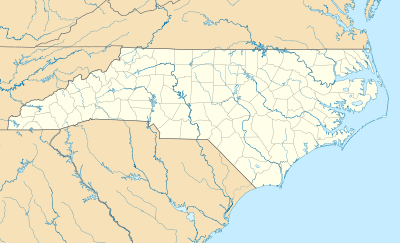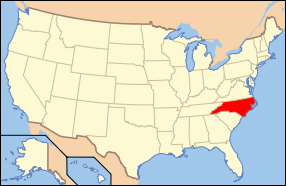Cleveland County Courthouse (Shelby, North Carolina)
|
Historic Cleveland County Courthouse | |
|
Old Cleveland County Courthouse, September 2009 | |
  | |
| Location | Main, Washington, Warren, and Lafayette Sts., Shelby, North Carolina |
|---|---|
| Coordinates | 35°17′29″N 81°32′22″W / 35.29139°N 81.53944°WCoordinates: 35°17′29″N 81°32′22″W / 35.29139°N 81.53944°W |
| Area | 1.8 acres (0.73 ha) |
| Built | 1907 |
| Built by | Falls City Construction Co. |
| Architect | Lewman, H.L. |
| Architectural style | Classical Revival |
| MPS | North Carolina County Courthouses TR |
| NRHP Reference # | 79001693[1] |
| Added to NRHP | May 10, 1979 |
Historic Cleveland County Courthouse is a courthouse building located at Shelby, Cleveland County, North Carolina.
History
The courthouse was built in 1907, and is a two-story, rectangular, Classical Revival-style building sheathed in a smooth ashlar veneer above a rusticated first floor. It features tetrastyle Corinthian order porticoes at each of the four entrances and a three-stage cupola atop the flat roof.
In 1916, Thomas Dixon, Jr., the author of The Clansman: A Historical Romance of the Ku Klux Klan, planned to erect a statue of his uncle Leroy McAfee on the courthouse square.[2][3] The project was initially met with enthusiasm,[2] until it was announced that Dixon wanted McAfee to wear a Ku Klux Klan mask in the statue.[3]
Courthouse offices moved to a new building in 1974, and the old courthouse houses offices, and public meeting hall. It was also home to the Cleveland County Historical Museum, which closed in 2012 and became the Earl Scruggs Center.[4]
It was listed on the National Register of Historic Places in 1979.[1] It is located in the Central Shelby Historic District.
Earl Scruggs Center
The courthouse is now home to the Earl Scruggs Center--"Music & Stories from the American South", which opened in 2014.[5] The museum focuses on both the life of local musician Earl Scruggs, and the music, history and culture of the American South. The museum also hosts concerts and music lectures.
References
- 1 2 National Park Service (2010-07-09). "National Register Information System". National Register of Historic Places. National Park Service.
- 1 2 "Cleveland Cullings". The Gastonia Gazette. Gastonia, North Carolina. September 22, 1916. p. 7. Retrieved September 28, 2016 – via Newspapers.com. (registration required (help)).
The announcement that Thomas Dixon will erect a monument on the Shelby court square to the memory of Col. Leroy McAfee is hailed with delight.
- 1 2 "Cleveland County Is Resenting Dixon's Plan". The Charlotte Observer. October 29, 1916. Retrieved September 28, 2016 – via Newspapers.com. (registration required (help)).
Whether or no Thomas Dixon suspected that such a project would meet with spirited opposition all over his home county and as a piece of news, become circulated widely by newspapers of the South, is another matter but if Mr Dixon wants to stir up things and keep his name before the public to better advertise his productive "The Fall of a Nation", he could not have selected anything more timely. Mr Dixon proposed to erect this monument to Colonel McAfee in Shelby, the county seat of Cleveland County, where "Tommy" was "brought up" and to include a Ku Klux masque.
- ↑ Mary Ann Lee and Joe Mobley (n.d.). "North Carolina County Courthouses TR: Cleveland County Courthouse" (pdf). National Register of Historic Places - Nomination and Inventory. North Carolina State Historic Preservation Office. Retrieved 2014-08-01.
- ↑ "Earl Scruggs Center opens in a deluge". Bluegrass Today. January 13, 2014. Retrieved 7 December 2014.
External links
- Earl Scruggs Center - official site

